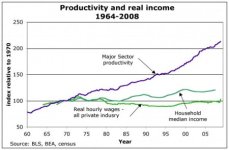Dave,
As you know, there has been a good deal of media chatter regarding the effects on McDonald's pricing if their labor costs increased. A point raised by many economists is that other things aren't going to remain equal.
For the sake of argument, let's say that your calculations are correct and that raising wages would increase all fast food prices by 20% (rounded). What's going to happen to fast food sales? The answer depends on the own-price elasticity of demand for fast foods. My brief search turned up an estimate of -1.9 (rounded) based on data for 1992 (
http://ageconsearch.umn.edu/bitstream/31162/1/26010058.pdf).* Using that estimate, increasing prices by 20% would decrease the number of meals sold by 38%. That means a lot fewer people would be required to flip burgers.
Economic theory predicts that when the price of labor (wages) increases relative to the price of capital (the interest rate), firms will substitute capital for labor. Automation of the ordering and preparation process will further decrease the demand for fast food labor (e.g.,
Momentum Machines | The Next Industrial Revolution).
Steve
* I was in graduate school with one of the authors, so I know he was well trained.

